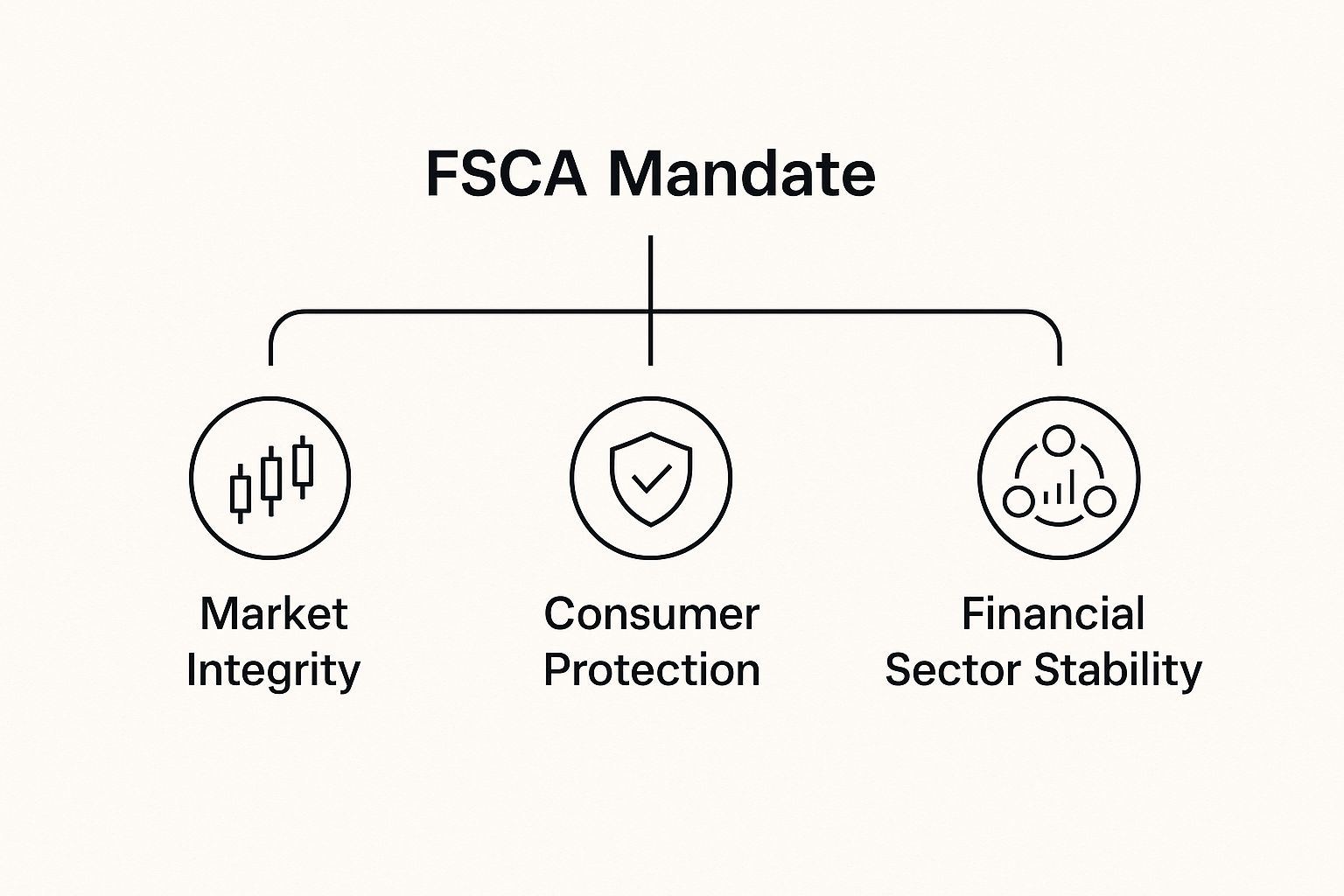Think of South Africa's financial market as a high-stakes game. The Financial Sector Conduct Authority (FSCA) is the referee, making sure everyone—from the biggest banks to the smallest payment providers—plays by the rules. This dedicated market conduct regulator was set up to protect customers and keep the marketplace fair, efficient, and transparent.
The Guardian of South African Financial Markets

The creation of the FSCA represented a major overhaul of how South Africa's financial industry is supervised. Before, a single body tried to manage everything. It was like having one person act as both a team's coach and the game's umpire—a clear conflict of interest. That old system often struggled to separate the goal of keeping institutions financially sound from the need to ensure they treated their customers ethically.
To fix this, the country split the job in two. The Financial Sector Conduct Authority (FSCA) was officially born under the Financial Sector Regulation Act 9 of 2017, and it hit the ground running on 1 April 2018. It took over from the old Financial Services Board (FSB) with a very specific job: to focus solely on how financial institutions behave in the market. This separated market conduct from prudential regulation (which is now handled by the Prudential Authority). You can dig deeper into this regulatory evolution and the FSCA's foundational mandate).
Why This Matters for Your Business
For any company in South Africa's financial space, especially those dealing with cross-border payments, the FSCA’s role is impossible to ignore. The authority sets the bar for how you operate, influencing everything from how you design your products and market them to the way you handle customer service and disclose fees.
Getting to grips with the FSCA’s framework is more than just a box-ticking exercise; it’s a strategic move. Following the rules builds a reputation for being reliable and trustworthy, which is gold when it comes to winning over and keeping customers in a crowded market.
"As a regulator, you have to balance innovation and customer protection." - Felicity Mabaso, Divisional Executive at the FSCA.
This quote perfectly captures the FSCA's mission. The goal is to create a market where new financial ideas can flourish without putting the consumers they serve at risk. This dual focus is what safeguards the long-term health and integrity of South Africa's entire financial system.
To get a clearer picture of the FSCA's duties, let's break down its core responsibilities.
FSCA at a Glance: Key Responsibilities
| Core Function | Description and Impact |
|---|---|
| Market Conduct Regulation | Sets and enforces rules on how financial institutions must behave. This includes ensuring fair treatment of customers, transparent product information, and ethical sales practices. |
| Consumer Protection | Works to protect financial customers from unfair practices, misleading marketing, and fraud. It empowers consumers by promoting financial literacy and providing channels for complaints. |
| Market Integrity | Monitors the market to prevent manipulation, insider trading, and other abusive practices. This helps maintain confidence and stability in South Africa’s financial systems. |
| Licensing and Supervision | Authorises and supervises financial institutions, including cross-border payment providers, to ensure they meet the required standards of conduct before and during their operation. |
| Promoting Fair Competition | Aims to create an environment where financial firms can compete on a level playing field, which encourages innovation and offers better value and choice for consumers. |
In short, these functions show that the FSCA isn’t just a watchdog; it’s an active architect of a healthier, more transparent financial ecosystem for everyone.
Understanding the FSCA's Twin Peaks Mandate
To get your head around the Financial Sector Conduct Authority (FSCA), you first need to understand South Africa's "Twin Peaks" regulatory model. It’s a pretty clever system. Think of it as having two highly specialised guardians watching over the entire financial sector, each with a very specific job. This structure was brought in to get rid of the conflicts of interest that were baked into the old single-regulator system.
One of these guardians is the Prudential Authority (PA), which is housed within the South African Reserve Bank. Its job is all about the financial stability of the institutions themselves. The PA makes sure that banks, insurers, and other big financial players are solid, have enough capital, and can actually meet their obligations without going under. In simple terms, they make sure the company is strong enough not to collapse.
The FSCA's Distinct Role
The other guardian is the Financial Sector Conduct Authority (FSCA). While the PA is busy checking the institution's balance sheets, the FSCA is focused on how that institution behaves and treats you, the customer. Its core mandate is to ensure the market is fair, efficient, and transparent for everyone involved.
This separation of duties is what makes the model so effective. A bank might be perfectly healthy financially (making the PA happy), but it could still be ripping off customers with hidden fees or pushing products that aren't suitable. That's precisely where the FSCA steps in. They are the ones protecting consumers and making sure the market as a whole has integrity.
The image below breaks down the key pillars of the FSCA's mandate.

As you can see, the FSCA's work is all built on protecting customers, ensuring the market is fair, and ultimately contributing to the stability of the entire financial sector.
The Pillars of Market Conduct in Action
So, what does this all mean in practice? The FSCA's high-level mandate translates into very real rules that affect businesses on the ground, especially those of us in the cross-border payments space.
Let’s look at what these pillars actually mean for a payment provider:
- Protecting Financial Customers: This is about more than just preventing fraud. It means being crystal clear in all your communications, being completely upfront about fees and exchange rates, and providing straightforward ways for customers to resolve any issues. No confusing jargon or hidden costs.
- Promoting Market Integrity: The FSCA is there to stop any kind of market manipulation and make sure it's a level playing field for all providers. This builds trust, which in turn encourages healthy competition. The end result? Better service and better pricing for everyone.
- Providing Financial Education: An informed customer is an empowered one. The FSCA backs initiatives that help people and businesses actually understand the financial products they're using, so they can make smart decisions.
The FSCA doesn't operate in a vacuum. It works alongside the Prudential Authority (PA), the National Credit Regulator (NCR), and the Financial Intelligence Centre (FIC). A 2022 assessment found that this integrated system, with the FSCA laser-focused on market conduct, has significantly strengthened South Africa's financial resilience. You can dive deeper into the findings in the World Bank and IMF's Financial Sector Assessment Program.
How the FSCA Regulates Cross-Border Payment Providers

For any fintech handling international payments in South Africa, this is where the theory hits the road. The Financial Sector Conduct Authority (FSCA) isn’t just about high-level principles; it lays down specific, non-negotiable rules for moving money across borders. Getting your head around these regulations isn't just a good idea—it’s the absolute foundation of a compliant and trustworthy service.
Let’s imagine a new startup, "PayGlobal SA," wants to make international invoicing easier for local businesses. Before they can dream of processing their first transaction, they have a massive hurdle to clear: getting the right licence from the FSCA. This is far from a box-ticking exercise. It's a deep-dive vetting process where the regulator scrutinises the company’s business model, its financial health, and the integrity of its leadership.
The Licensing Gateway
First things first, you have to become a licensed Financial Services Provider (FSP). It’s the only legal way to play in this space. The FSCA will look at everything to make sure PayGlobal SA has the right systems in place to operate ethically and competently. This approval basically signals to the market that you're a legitimate player, ready to be held to the highest standards. Operating without this licence is illegal, plain and simple.
Once you’re in, the real work begins. PayGlobal SA would have to stick to a strict set of ongoing conduct standards designed to protect both its customers and the wider financial system.
Here are some of the key rules they'd have to live by:
- Transparent Fee Disclosures: You have to tell the customer exactly what a transaction will cost before they agree to it. No hidden fees, no confusing percentages buried in the small print.
- Fair Exchange Rate Practices: You can't lure customers in with misleading "teaser" rates. The FSCA insists that the exchange rate you apply is fair and clearly explained, so customers don’t get a nasty surprise.
- Robust Complaint Resolution: Having a clear and easy-to-find process for handling complaints is mandatory. This also means understanding how customers can resolve disputes, which might involve something like initiating a debit card chargeback.
- Stringent Reporting: Licensed providers must send regular, detailed reports to the FSCA. This is how the authority keeps an eye on the market and makes sure everyone is playing by the rules.
Combatting Financial Crime
Beyond looking out for the customer, a huge chunk of the FSCA's mandate is stopping financial crime in its tracks. This is where Anti-Money Laundering (AML) and Counter-Financing of Terrorism (CFT) controls come into sharp focus. For a company like PayGlobal SA, this means building a rock-solid system to verify every customer's identity (Know Your Customer/KYC) and constantly monitoring transactions for anything that looks suspicious.
Every cross-border payment provider is a gatekeeper of the financial system. The FSCA mandates that these gatekeepers are vigilant, requiring them to report any unusual transactions to the Financial Intelligence Centre (FIC).
And they are not messing around. Failing to have proper AML controls can bring down the hammer, resulting in massive fines and even having your licence torn up. For our startup, PayGlobal SA, this means putting serious money into both technology and staff training. Their compliance systems can't just look good on paper; they have to work in the real world.
Ultimately, building a successful service under the FSCA's watch means weaving these principles of transparency, fairness, and security into the very DNA of the company from the moment it’s conceived.
Navigating FSCA Compliance for Your Business

Getting your business compliant with the Financial Sector Conduct Authority (FSCA) can feel like a massive undertaking. But if you break it down into clear, manageable steps, it's entirely achievable. Think of it less as a hurdle and more as building a foundation of trust with your customers and partners.
The best place to start is with a thorough gap analysis. This is essentially a "health check" where you map out your current operations and hold them up against the FSCA's rulebook. It's a critical exercise that helps you see exactly where your business might be falling short before it becomes a real problem.
Once you know where the gaps are, you can create a targeted action plan. This isn't just a to-do list; it's a detailed roadmap outlining the specific policies, procedures, and controls you need to put in place to get everything in order.
Building a Culture of Compliance
A truly effective compliance framework isn't just a document that gathers dust on a shelf—it has to be part of your company's DNA. This starts with appointing a dedicated compliance officer, someone with the authority and resources to champion the programme from the inside. They become your go-to expert on all things FSCA.
Another key piece of the puzzle is having a clear, accessible way to handle customer complaints. The FSCA puts enormous emphasis on treating customers fairly, and having a solid complaints process shows you’re serious about it. It proves you're listening and are ready to resolve issues transparently.
The FSCA's focus on fair conduct isn't just about rules; it has had a massive real-world impact. This oversight was crucial in building the consumer confidence needed to expand formal financial inclusion in South Africa to 98% of adults by 2023. That’s a staggering jump from just 30% of low-income individuals back in 2003.
Staying on Top of Your Game
Compliance isn’t a "set it and forget it" task. It requires constant attention and the ability to adapt. Regular staff training is non-negotiable, ensuring everyone in your organisation understands their role in the FSCA framework, from data protection to anti-money laundering protocols.
It's also worth noting that your compliance duties don't end at your own front door. If you're outsourcing financial services, your responsibilities extend to any third-party providers you work with.
An actionable checklist can help keep you on track:
- Run Regular Risk Assessments: Periodically review your operations to spot any new or changing compliance risks.
- Keep Policies Updated: Your internal rulebook must evolve alongside any changes in FSCA regulations.
- Monitor Transactions: Put systems in place to flag suspicious activities, which is a core part of your anti-money laundering duties.
- Keep Meticulous Records: Good record-keeping is the backbone of proving your compliance if the FSCA ever comes knocking.
By turning these requirements into a practical roadmap, compliance stops being a burden and becomes a strategic advantage that strengthens your business and minimises risk.
The Future of Financial Regulation Under the FSCA
The financial world doesn’t stand still, and neither does the Financial Sector Conduct Authority (FSCA). For any business that wants to build a sustainable, compliant operation, it’s not enough to know the rules today; you have to understand where the regulator is headed tomorrow.
The FSCA is actively getting ahead of the curve, particularly when it comes to new technology. They're not just reacting to change; they're building the frameworks to manage it.
Embracing New Financial Frontiers
The authority has its sights set firmly on two major forces reshaping the industry: crypto assets and artificial intelligence. The approach isn't to shut them down but to bring them into a well-regulated space.
Crypto Asset Regulation: The FSCA has already started bringing crypto asset service providers into its regulatory net. Looking ahead, we can expect much clearer rules designed to protect consumers, stamp out market abuse, and stop these digital assets from being used for illegal activities.
AI-Driven Financial Advice: As algorithms start offering financial guidance, the FSCA is working on how to ensure that advice is fair, transparent, and genuinely suitable for the person receiving it. It's a classic balancing act: harnessing the power of AI without sacrificing consumer safety.
"As a regulator, you have to balance innovation and customer protection."
– Felicity Mabaso, Divisional Executive at the Financial Sector Conduct Authority (FSCA)
This quote from Felicity Mabaso really captures the FSCA's mindset. They’ve even set up a dedicated fintech team and a regulatory "sandbox." This lets innovative companies test new ideas in a controlled environment, giving the FSCA a front-row seat to understand new risks before they hit the wider market.
A Sharper Focus on Digital Security
Beyond specific technologies, the FSCA is putting a much bigger spotlight on cybersecurity and data privacy. With financial services becoming almost entirely digital, protecting customer data and securing platforms from attack aren't just IT problems anymore—they are fundamental to good market conduct.
What does this mean for your business? It means compliance has to be forward-looking. A smart strategy isn't just about ticking today's boxes; it’s about building the technological and security standards that will be expected tomorrow.
Common Questions About the FSCA
Getting to grips with the Financial Sector Conduct Authority (FSCA) can feel daunting, but a few key questions come up time and time again. Let's break down the answers to help you understand your obligations and operate with confidence.
FSCA vs FSB: What's the Difference?
You might remember the old Financial Services Board (FSB). The switch to the FSCA wasn't just a name change; it marked a fundamental shift in how South Africa's financial sector is regulated. This is thanks to the "Twin Peaks" model.
Think of the old FSB as a single watchdog trying to do two massive jobs at once: making sure financial institutions were financially stable and that they were treating customers fairly. This often created a conflict of interest.
The new model splits those duties. The FSCA now has a laser focus on one thing: market conduct. That means how financial companies behave, how they treat you, and the transparency of their products. A separate body, the Prudential Authority (PA), is now responsible for making sure the institutions themselves are financially sound and won't collapse. This specialisation makes the whole system much sharper and more effective.
Does the FSCA Regulate All Financial Institutions?
The FSCA's authority is broad, but it doesn't cover absolutely everyone. Its main job is to oversee the conduct of any institution offering a financial product or service in South Africa. This is a huge net that catches banks, insurers, investment managers, and pension funds.
Crucially for our discussion, it also regulates Financial Service Providers (FSPs), which includes businesses like cross-border payment providers. However, some areas have their own dedicated regulator. For example, credit providers fall under the National Credit Regulator (NCR), which operates alongside the FSCA.
How Does a Business Apply for an FSP Licence?
Getting an FSP licence is a serious undertaking, not just a box-ticking exercise. You have to submit a very detailed application to the FSCA, proving you are 'fit and proper' to handle other people's money.
This isn't just about having a good business idea. You need to demonstrate that:
- The people running the show are competent, experienced, and have integrity.
- You have solid operational systems and financial controls in place.
- Your risk management processes are robust and well-documented.
- Your application must be backed by a thorough business plan and clear compliance procedures.
What Are the Consequences of Non-Compliance?
The FSCA doesn't pull its punches. If you don't play by the rules, the consequences are designed to be a powerful deterrent to protect consumers.
Penalties can be severe. We're talking about everything from eye-watering financial fines to having your FSP licence suspended or even permanently revoked. In the most serious cases, directors and key individuals can face criminal prosecution. This really drives home just how critical it is to build a strong culture of compliance from day one.
For South African businesses managing international payments, staying on the right side of FSCA regulations while battling high forex costs is a constant juggling act. Zaro cuts through the complexity by offering the real exchange rate with zero spread and no hidden fees. It’s a straightforward way to protect your bottom line while staying compliant. Discover a smarter way to handle cross-border finance at https://www.usezaro.com.
